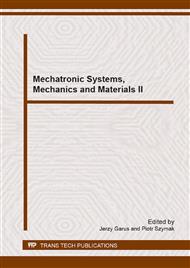[1]
K.J. Astrom, R.M. Murray: Feedback systems (Princeton University Press, New Jersey 2008).
Google Scholar
[2]
N. Baba, L.C. Jain: Computational intelligence in games (Physica-Verlag, New York 2001).
Google Scholar
[3]
J.C. Engwerda: LQ dynamic optimization and differential games (John Wiley and Sons, West Sussex 2005).
Google Scholar
[4]
T.I. Fossen: Marine craft hydrodynamics and motion control (Wiley, West Sussex 2011).
Google Scholar
[5]
R. Isaacs: Differential games (John Wiley and Sons, New York 1965).
Google Scholar
[6]
K.J. Keesman: System identification (Springer, London-New York 2011).
Google Scholar
[7]
I.D. Landau, R. Lozano, M.M. Saad and A. Karimi: Adaptive control (Springer, London-New York 2011).
Google Scholar
[8]
J. Lisowski: The multistage positional game of marine objects with different degree of cooperation. Solid State Phenomena, Vol. 180 (2012), pp.56-63.
DOI: 10.4028/www.scientific.net/ssp.180.56
Google Scholar
[9]
J. Lisowski, A. Lazarowska: The radar data transmission to computer support system of ship safety. Solid State Phenomena, Vol. 196 (2013), pp.95-101.
DOI: 10.4028/www.scientific.net/ssp.196.95
Google Scholar
[10]
J. Lisowski: The sensitivity of computer support game algorithms of a safe ship control. International Journal Applied Mathematics and Computer Science, Vol. 23, No 2 (2013), in press.
DOI: 10.2478/amcs-2013-0033
Google Scholar
[11]
I. Millington, J. Funge: Artificial intelligence for games (Elsevier, Amsterdam-Tokyo 2009).
Google Scholar
[12]
M. Modarres: Risk analysis in engineering (Taylor and Francis Group, Boca Raton 2006).
Google Scholar
[13]
N. Nisan, T. Roughgarden, E. Tardos and V.V. Vazirani: Algorithmic game theory (Cambridge University Press, New York 2007), pp.717-733.
DOI: 10.1017/cbo9780511800481
Google Scholar
[14]
N.S. Nise: Control systems engineering (John Wiley and Sons, New York 2011).
Google Scholar
[15]
M.J. Osborne: An introduction to game theory (Oxford University Press, New York 2004).
Google Scholar
[16]
E. Zio: Computational methods for reliability and risk analysis. Quality, Reliability and Engineering Statistics, No 14 (2009), pp.295-334.
Google Scholar


